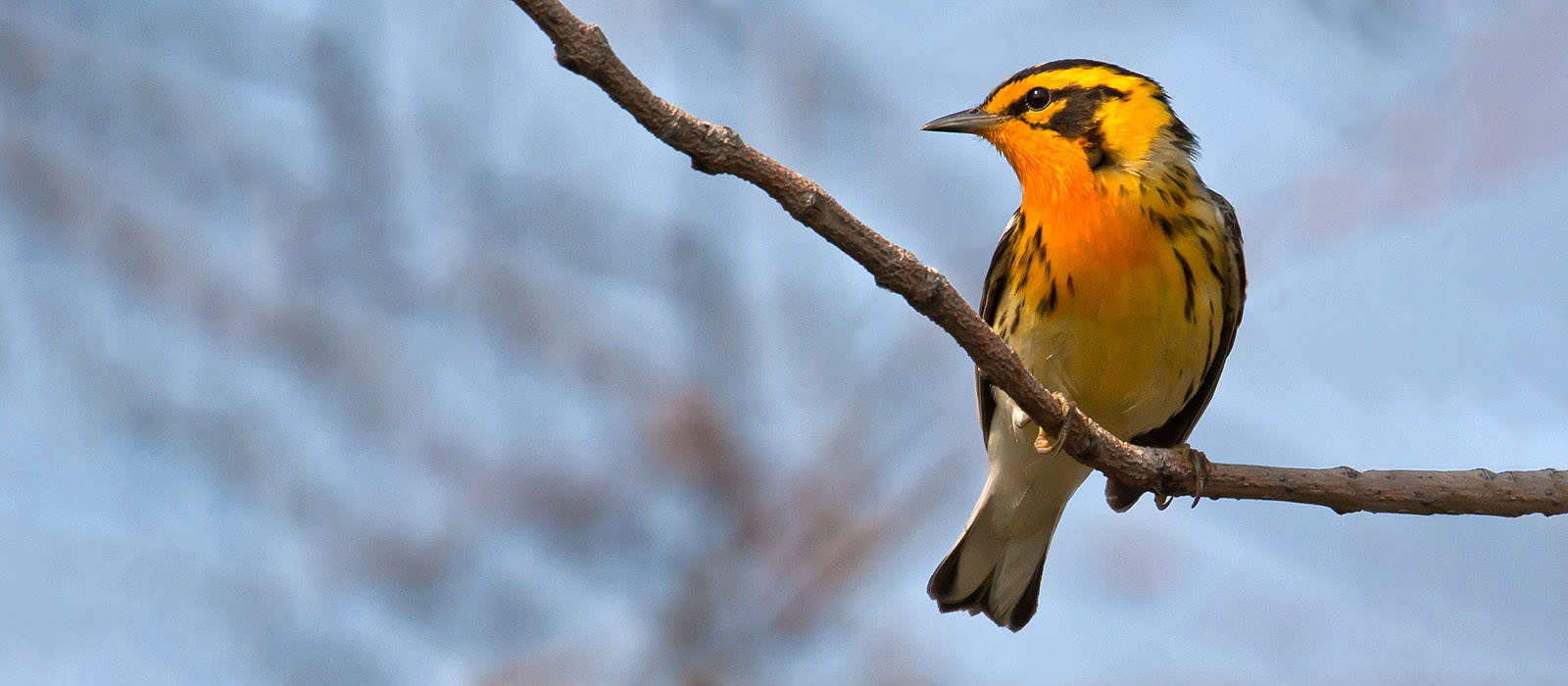
A Fading Serenade
Aging and adjusting as a field biologist
An Essay for The Boston Globe
Find more essays like this one at my new venue online, Chasing Nature.
From his perch high in a red spruce, a Blackburnian warbler reminds me of my age. This has nothing to do with the fact that every June for 30 years — nearly half of my life — I have bushwhacked the same route through woods in northern Vermont, stopping at the same five trees for exactly 10 minutes apiece to count every bird I see or hear. Nor does it have anything to do with my diminishing ability to see a Blackburnian warbler, whose face, throat, and upper breast glow like fire.
This is instead about a fading serenade. Despite his orange blaze, the easiest way to find a Blackburnian warbler up there in the spruce is to listen for the male’s song. In each rendition, he rubs together a couple of high, raspy notes, ending with an even higher, thin “szeeeee.” In summer, when leaves and needles block our view, recognizing songs is the best way to identify birds in the forest. Yet now that I am 63 years old, the dawn chorus is fading, one note at a time. No longer can my ears detect the Blackburnian warbler’s final note.
Birdwatchers joke that these high notes are the first things to go. Not for me. That was my ability to read my compass dial in the woods without eyeglasses. Next, arthritis and a torn meniscus brought pain to my right knee with every step along my forest bird route. And I now fall down more often on these birdwatching bushwhacks, not because of my failing eyesight or bad knee, and not even because a heart attack put me down in the woods four years ago. I fall because my mind propels me onward at a pace the rest of my body can no longer keep.
I am an aging field biologist; the songbirds’ fading chorus is among the inevitable casualties.
I know that aging is about acceptance, slowing down and recognizing new limitations. I am an aging field biologist; the songbirds’ fading chorus is among the inevitable casualties.
So is the ongoing decline of birds in the natural world. Each is a kind of approaching silent spring — one borne entirely of my advancing age, the other of humanity’s relentless assault on wildlife and wild places. My annual trek through the woods — at a place called Bear Swamp — is one among 32 routes in a long-term forest bird population study run by the Vermont Center for Ecostudies. We count birds to witness what we’re losing — and to inspire ideas of what we might do about it.
During my 30 years of walking through Bear Swamp, two bird species — black-backed woodpecker and yellow-bellied flycatcher — vanished from my forest route, and not because I could no longer hear them. In its first 25 years, the Vermont study documented a 14 percent overall population decline among 125 forest bird species. By now the threats to birds everywhere are well known: invasive species, domestic cats, the climate crisis, industrial agriculture, habitat destruction, to name but a few.
Forests, like people, are about growth and change and death. Yet even as I recognize that aging is about gaining perspective and wisdom, I’m having a tough time accepting my decline in proximity to nature’s. Walking in forests and hearing their birds very much defines who I am. I do not like growing old while watching nature grow scarcer.
I reluctantly abandoned the Blackburnian warblers and other songbirds at Bear Swamp this year. Not because there was nothing left for me in the forest — far from it. Instead, I quit precisely owing to my diminishing skills. Even with my new hearing aids, I had concluded that my data — my ability to detect warblers and other songbirds — would no longer be reliable for the study.
So what will become of that serenade playing out each June at Bear Swamp? I turned over the route to one of my former graduate students, Sean Beckett, a skilled field naturalist who is half my age. Even as I leave for him an imperfect world, Sean leaves me with hope: He has the temerity to care enough about what’s next for all of us, and the skills, hearing, and legs to do something about it.
My work is done at Bear Swamp. Even so, with unsettled acceptance, on my bum knee I’ll walk onward to keep the horizons — my own and nature’s — from fading. Along the way I’ll miss those high notes just as surely as I will stumble and fall. No matter.
Although we are both damaged goods, nature now offers me slower rewards, quieter harmonies: the whispering butterflies of summer meadows, the furtive orchids of northern bogs, the silent ways of winter woods.
They need saving as well.

Well said, good sir! I just came across this eloquent essay, and it made me regret the many years we have been out of touch, Bryan. Congratulations on your Bog Elfin, by the way! Be well, –Ben Rose
Somehow it feels that each and every one of your blogs has touched gently on the specific topic of this one. I expect because they all carry such reverence for the natural world, and to anyone paying attention to that world who is old enough to notice the change and diminishing
there, your concern and reverence is always present. This one feels more poignant than most. How does one say thank you for such an incredibly beautiful gift……? Thank you…..
You hit the nail on the head. Having just turned 80 and having run saws for decades, bird songs haven’t gotten through to me for many years. But wildflowers still bloom, leaves turn color in the fall, the breeze still moves grass in the fields, there are amphibians in the pools in the spring — life goes on even if I can’t hear it. Thank you for a well written essay.
Thank you for putting into words the thoughts I have carried in my head. I do miss things in the woods by not hearing them correctly but it still a sight to behold coming onto a flock of turkeys scratching at the forest floor. all of it is to be enjoyed. now to get the hearing tests done. how sweet our lives are.
Thanks for this, Bryan,
The poet Donald Hall says that old age “is a ceremony of losses…” Your essay brilliantly captures that truth. As I get older (and older, and older…) I am aware of my personal losses, and I also grieve about the loss of birds, birdsong, the fragile beauty of this world.
Thanks for this honest, moving essay.
Tom
Thanks for the reprint, Bryan. I have little doubt that you’ll continue to contribute, as you always have. With slowing down comes the eventual recognition that we’re not done contributing.
As long as you’re putting one foot in front of the other out in nature, she will reward you in new & different ways. You just have to take it in & enjoy what you’re given. Thanks for all your insights into birds, dragonflies and life itself. Keep writing…you inspire sooo many people. As we age we get better…yet not always in the same ways. We find ones that better suit our abilities… Ever Onward Bryan!!
As a fellow FBMP recorder in my mid 60s, gulp, I too dread the day. If and hopefully not when, I have decreased hearing, I hope monitoring the hawk migration, and lake watches, will still fulfill my birding RBAs (recommended birding allowances). In the meantime I use hearing protection during airplane travel, lawn mowing, coffee bean grinding, movies, concerts, and open window car driving. Some of these not too common these days. I hear you loud and clear….no pun intended.
Missed you this year on my yearly sojourn to Monhegan. Your piece came to me the day I was leaving. It stated so eloquently my own troubling reflections as I hiked the trails and negotiated the ‘back side’. In my 77th year, I, too, am realizing that I am not as young as I used to be and that my mind still expects me to perform in ways my body no longer can do with ease. Once I could hop from rock to rock with bare feet; now I carefully plant my stick and slowly consider where I can best put my next step, in carefully laced hiking boots, no less. I slowly realized over the week that beauty can still be found at a slower pace, looking closely at things I once might have whizzed by on my way to Somewhere Else. Thank you, Bryan, as always.
Thanks Bryan, for being so honest and forthright about aging and letting go. The pleasure you’ve received from engaging so many beautiful birds (and guiding so many of us to know who the hell we were hearing) I hope has created a vast store of memories you can draw on for delight and unfaded refreshment.
Thank you, Bryan. Eloquently written and a graceful nod to both the losses and gains of growing older, and the gratitude for those younger who are willing and able to carry to on in your stead.
Eileen
Oh Bryan, this so resonates with me. I had to stop a 20 year run with a BBS route (that partly was behind Black Bear Swamp) because of “losing” the high songs. I have always been an auditory birder, so that’s been hard for me. I do have new knees, and that has helped, but I have cataracts, and I know they are dimming my views (surgery next year). I find I am paying much more attention to field marks now that I can’t hear the birds as well. But you so eloquently voiced some of my experience. I am eternally grateful though that I live in such a beautiful place, and can still do a lot of birding. It’s hard to believe that I’m 76, but I am, and I always remind myself that the alternative to getting old is, well, to not get old.
Just lovely, Bryan! Ray has lost his ability to hear most high notes, even with hearing aids. Fortunately, at 66 years old, I am still hearing them well. Thanks for your long standing field study. I am sure it is in very good hands. Sincerely, Liz
Gorgeous, poignant, and inspiring. Thank you, Bryan,
for remind us about what matters.
with gratitude,
Kim